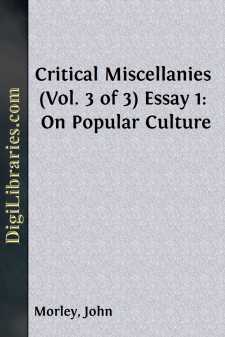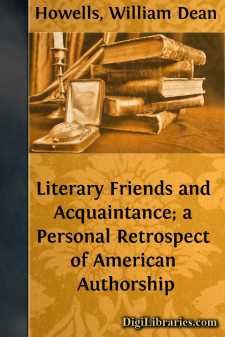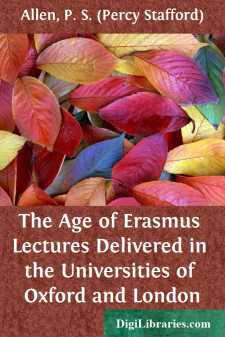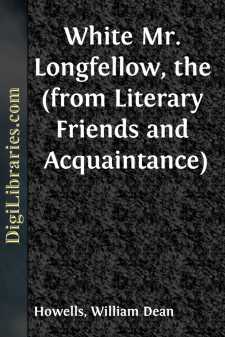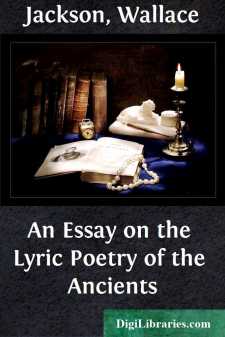Literary Criticism
- American 18
- Ancient and Classical 3
- Asian 1
- Australian & Oceanian 1
- Books & Reading 8
- Caribbean & Latin American 2
- Drama 2
- English, Irish, Scottish, Welsh 49
- European 7
- General 37
- Horror 1
- Humor 2
- Jewish 2
- Medieval 2
- Middle Eastern 3
- Poetry 7
- Renaissance 6
- Russian & Former Soviet Union 1
- Shakespeare 27
Literary Criticism Books
Sort by:
by:
John Morley
The proceedings which have now been brought satisfactorily to an end are of a kind which nobody who has sensibility as well as sense can take a part in without some emotion. An illustrious French philosopher who happened to be an examiner of candidates for admission to the Polytechnic School, once confessed that, when a youth came before him eager to do his best, competently taught, and of an apt...
more...
by:
Julius West
INTRODUCTORYThehabit, to which we are so much addicted, of writing books about other people who have written books, will probably be a source of intense discomfort to its practitioners in the twenty-first century. Like the rest of their kind, they will pin their ambition to the possibility of indulging in epigram at the expense of their contemporaries. In order to lead up to the achievement of this...
more...
by:
Desmond Byrne
Any survey of the work done by Australian authors suggests a question as to what length of time ought to be allowed for the development of distinctive national characteristics in the literature of a young country self-governing to the extent of being a republic in all but name, isolated in position, highly civilised, enjoying all the modern luxuries available to the English-speaking race in older...
more...
Long before I began the papers which make up this volume, I had meant to write of literary history in New England as I had known it in the lives of its great exemplars during the twenty-five years I lived near them. In fact, I had meant to do this from the time I came among them; but I let the days in which I almost constantly saw them go by without record save such as I carried in a memory retentive,...
more...
§ 1. THE MAIN (SENTIMENTAL) PLOT OF THE FOUR LOVERS AND THE COURT OF THESEUS "And out of olde bokes, in good feith, Cometh al this newe science that men lere." Chaucer. As the play opens with speeches of Theseus and Hippolyta, it is convenient to treat first of these two characters. Mr. E.K. Chambers has collected (in Appendix D to his edition) nine passages from North's Plutarch's...
more...
by:
John Palmer
I There is a tale of Mr Kipling which relates how Eustace Cleever, a celebrated novelist, came to the rooms of a young subaltern and his companions who were giving an account of themselves. Eustace Cleever was a literary man, and was greatly impressed when he learned that one of the company, who was under twenty-five and was called the Infant, had killed people somewhere in Burma. He was suddenly...
more...
CHAPTER I.INTRODUCTORY. Village libraries—Difficulties of travel—Literary Societies in the Highlands—Gaelic books—Happiness and geniality of natives—Oban to Gairloch—Winter sailing—A crofting village—Horrors of the Minch—Notes on Lewis—Highland doctors—Hotels and anglers—Recent books—Military—Moray Firth—Among the miners—Handloom weaving—Professor Blackie and the...
more...
I THE ADWERT ACADEMY The importance of biography for the study of history can hardly be overrated. In a sense it is true that history should be like the law and 'care not about very small things'; concerning itself not so much with individual personality as with fundamental causes affecting the rise and fall of nations or the development of mental outlook from one age to another. But even if...
more...
We had expected to stay in Boston only until we could find a house in Old Cambridge. This was not so simple a matter as it might seem; for the ancient town had not yet quickened its scholarly pace to the modern step. Indeed, in the spring of 1866 the impulse of expansion was not yet visibly felt anywhere; the enormous material growth that followed the civil war had not yet begun. In Cambridge the...
more...
by:
Wallace Jackson
INTRODUCTION John Ogilvie (1733-1813), Presbyterian divine and author, was one of a group of Scottish literary clergy and a fellow of the Edinburgh Royal Society. Chambers and Thomson print the following generous estimation of his work:Of all his books, there is not one which, as a whole, can be expected to please the general reader. Noble sentiments, brilliant conceptions, and poetic graces, may be...
more...


